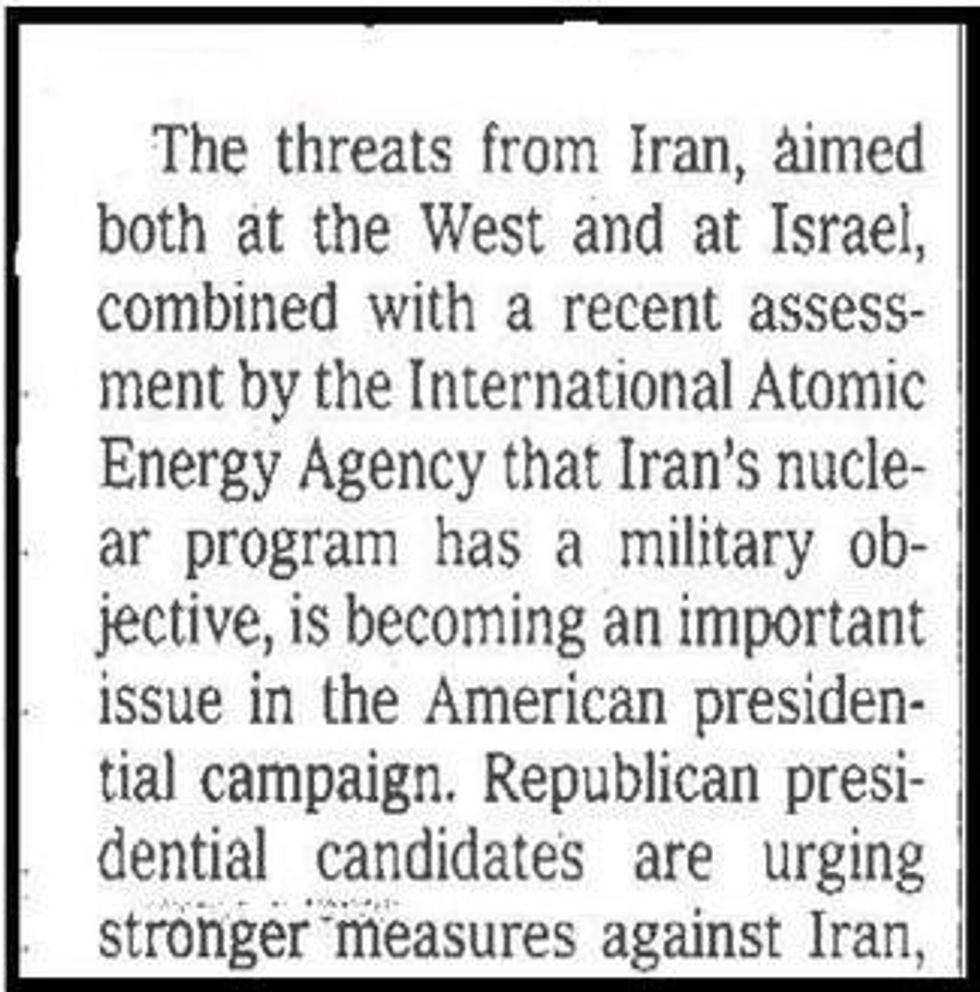On Iran IAEA Reporting Complaints, NYT Public Editor Rules for the Plaintiffs
Responding to complaints over a New York Times report that purported to cite "a recent assessment by the International Atomic Energy Agency that Iran's nuclear program has a military objective," New York Times Public Editor Arthur Brisbane has written that the complaints were just, and that the New York Times should correct the story.

Brisbane wrote:
I think the readers are correct on this. The Times hasn't corrected the story but it should because this is a case of when a shorthand phrase doesn't do justice to a nuanced set of facts. In this case, the distinction between the two is important because the Iranian program has emerged as a possible casus belli.
In other words: it's important to get this right, because getting it wrong unjustly promotes the cause of war.
As of this writing - eight hours after the Public Editor's post, six days after the original article appeared, and people first complained about it - there is still no correction.
You can't find the article, as it originally appeared, on the New York Times website, because the Times deleted the paragraph with the offending claim from the version now on the web, without running a correction or publishing a note explaining the change. But you can see the article as it originally ran here.
Note that in other contexts - not linked to the fervent desire of some people for military confrontation with Iran - the Times purports to be quite punctilious about corrections, as when it corrected a misidentified character from an animated children's TV show.
Although it is unacceptable that the Times is still refusing to run a correction of its erroneous and dangerously misleading story, it is unquestionably a very good thing that at least there is a place associated with the Times where you can complain about its reporting and get a public response that acknowledges the justice of your complaint.
We complained to NBC's Meet the Press about the fact that David Gregory did not challenge Rick Santorum on his claim that there aren't UN nuclear inspectors in Iran, and did not even receive any acknowledgement of the complaint, let alone a response.
We complained to the Washington Post when it used the headline "Iran's quest to possess nuclear weapons." The Washington Post did the right thing. They corrected the headline, and they added an editor's note explaining the change. In addition, the Washington Post Ombudsman wrote in his column that the complaints about the headline were just and important.
So, to the Washington Post, full marks. To the New York Times, partial credit. To NBC's Meet the Press, zero.
Now, let's engage in a little experiment. Some people see PBS and NPR as publicly funded alternatives to commercial media. Others see them as the "Pentagon Broadcasting System" and "National Pentagon Radio."
If we complain to PBS and NPR when they report allegations that Iran has a nuclear weapons program as if they are known facts, how will they respond? Will they be more like the Washington Post, the New York Times, or NBC?
On Sunday, Defense Secretary Panetta told Face the Nation that Iran is not now trying to develop nuclear weapons. "Are they trying to develop a nuclear weapon? No."
AP reported this straight: "US: Iran has not yet decided to build nuclear bomb."
But as Fairness & Accuracy in Reporting noted, on Monday, PBS NewsHour deceptively edited Panetta's comments to exclude his statement that Iran is not trying to develop a nuclear weapon, and then used his comments to try to suggest the opposite, that Iran is now pursuing a nuclear weapon.
You can write to NewsHour here. You can write to the PBS Ombudsman here.
On NPR's Weekend Edition Sunday, reporter Tom Gjelten said, "The goal for the U.S. and its allies ... [is] to convince Iran to give up a nuclear weapons program," thereby implying that Iran already has a nuclear weapons program, which is certainly not a known fact.
You can ask for a correction from NPR here. You can write to the NPR Ombudsman here.
An Urgent Message From Our Co-Founder
Dear Common Dreams reader, The U.S. is on a fast track to authoritarianism like nothing I've ever seen. Meanwhile, corporate news outlets are utterly capitulating to Trump, twisting their coverage to avoid drawing his ire while lining up to stuff cash in his pockets. That's why I believe that Common Dreams is doing the best and most consequential reporting that we've ever done. Our small but mighty team is a progressive reporting powerhouse, covering the news every day that the corporate media never will. Our mission has always been simple: To inform. To inspire. And to ignite change for the common good. Now here's the key piece that I want all our readers to understand: None of this would be possible without your financial support. That's not just some fundraising cliche. It's the absolute and literal truth. We don't accept corporate advertising and never will. We don't have a paywall because we don't think people should be blocked from critical news based on their ability to pay. Everything we do is funded by the donations of readers like you. Will you donate now to help power the nonprofit, independent reporting of Common Dreams? Thank you for being a vital member of our community. Together, we can keep independent journalism alive when it’s needed most. - Craig Brown, Co-founder |
Responding to complaints over a New York Times report that purported to cite "a recent assessment by the International Atomic Energy Agency that Iran's nuclear program has a military objective," New York Times Public Editor Arthur Brisbane has written that the complaints were just, and that the New York Times should correct the story.

Brisbane wrote:
I think the readers are correct on this. The Times hasn't corrected the story but it should because this is a case of when a shorthand phrase doesn't do justice to a nuanced set of facts. In this case, the distinction between the two is important because the Iranian program has emerged as a possible casus belli.
In other words: it's important to get this right, because getting it wrong unjustly promotes the cause of war.
As of this writing - eight hours after the Public Editor's post, six days after the original article appeared, and people first complained about it - there is still no correction.
You can't find the article, as it originally appeared, on the New York Times website, because the Times deleted the paragraph with the offending claim from the version now on the web, without running a correction or publishing a note explaining the change. But you can see the article as it originally ran here.
Note that in other contexts - not linked to the fervent desire of some people for military confrontation with Iran - the Times purports to be quite punctilious about corrections, as when it corrected a misidentified character from an animated children's TV show.
Although it is unacceptable that the Times is still refusing to run a correction of its erroneous and dangerously misleading story, it is unquestionably a very good thing that at least there is a place associated with the Times where you can complain about its reporting and get a public response that acknowledges the justice of your complaint.
We complained to NBC's Meet the Press about the fact that David Gregory did not challenge Rick Santorum on his claim that there aren't UN nuclear inspectors in Iran, and did not even receive any acknowledgement of the complaint, let alone a response.
We complained to the Washington Post when it used the headline "Iran's quest to possess nuclear weapons." The Washington Post did the right thing. They corrected the headline, and they added an editor's note explaining the change. In addition, the Washington Post Ombudsman wrote in his column that the complaints about the headline were just and important.
So, to the Washington Post, full marks. To the New York Times, partial credit. To NBC's Meet the Press, zero.
Now, let's engage in a little experiment. Some people see PBS and NPR as publicly funded alternatives to commercial media. Others see them as the "Pentagon Broadcasting System" and "National Pentagon Radio."
If we complain to PBS and NPR when they report allegations that Iran has a nuclear weapons program as if they are known facts, how will they respond? Will they be more like the Washington Post, the New York Times, or NBC?
On Sunday, Defense Secretary Panetta told Face the Nation that Iran is not now trying to develop nuclear weapons. "Are they trying to develop a nuclear weapon? No."
AP reported this straight: "US: Iran has not yet decided to build nuclear bomb."
But as Fairness & Accuracy in Reporting noted, on Monday, PBS NewsHour deceptively edited Panetta's comments to exclude his statement that Iran is not trying to develop a nuclear weapon, and then used his comments to try to suggest the opposite, that Iran is now pursuing a nuclear weapon.
You can write to NewsHour here. You can write to the PBS Ombudsman here.
On NPR's Weekend Edition Sunday, reporter Tom Gjelten said, "The goal for the U.S. and its allies ... [is] to convince Iran to give up a nuclear weapons program," thereby implying that Iran already has a nuclear weapons program, which is certainly not a known fact.
You can ask for a correction from NPR here. You can write to the NPR Ombudsman here.
Responding to complaints over a New York Times report that purported to cite "a recent assessment by the International Atomic Energy Agency that Iran's nuclear program has a military objective," New York Times Public Editor Arthur Brisbane has written that the complaints were just, and that the New York Times should correct the story.

Brisbane wrote:
I think the readers are correct on this. The Times hasn't corrected the story but it should because this is a case of when a shorthand phrase doesn't do justice to a nuanced set of facts. In this case, the distinction between the two is important because the Iranian program has emerged as a possible casus belli.
In other words: it's important to get this right, because getting it wrong unjustly promotes the cause of war.
As of this writing - eight hours after the Public Editor's post, six days after the original article appeared, and people first complained about it - there is still no correction.
You can't find the article, as it originally appeared, on the New York Times website, because the Times deleted the paragraph with the offending claim from the version now on the web, without running a correction or publishing a note explaining the change. But you can see the article as it originally ran here.
Note that in other contexts - not linked to the fervent desire of some people for military confrontation with Iran - the Times purports to be quite punctilious about corrections, as when it corrected a misidentified character from an animated children's TV show.
Although it is unacceptable that the Times is still refusing to run a correction of its erroneous and dangerously misleading story, it is unquestionably a very good thing that at least there is a place associated with the Times where you can complain about its reporting and get a public response that acknowledges the justice of your complaint.
We complained to NBC's Meet the Press about the fact that David Gregory did not challenge Rick Santorum on his claim that there aren't UN nuclear inspectors in Iran, and did not even receive any acknowledgement of the complaint, let alone a response.
We complained to the Washington Post when it used the headline "Iran's quest to possess nuclear weapons." The Washington Post did the right thing. They corrected the headline, and they added an editor's note explaining the change. In addition, the Washington Post Ombudsman wrote in his column that the complaints about the headline were just and important.
So, to the Washington Post, full marks. To the New York Times, partial credit. To NBC's Meet the Press, zero.
Now, let's engage in a little experiment. Some people see PBS and NPR as publicly funded alternatives to commercial media. Others see them as the "Pentagon Broadcasting System" and "National Pentagon Radio."
If we complain to PBS and NPR when they report allegations that Iran has a nuclear weapons program as if they are known facts, how will they respond? Will they be more like the Washington Post, the New York Times, or NBC?
On Sunday, Defense Secretary Panetta told Face the Nation that Iran is not now trying to develop nuclear weapons. "Are they trying to develop a nuclear weapon? No."
AP reported this straight: "US: Iran has not yet decided to build nuclear bomb."
But as Fairness & Accuracy in Reporting noted, on Monday, PBS NewsHour deceptively edited Panetta's comments to exclude his statement that Iran is not trying to develop a nuclear weapon, and then used his comments to try to suggest the opposite, that Iran is now pursuing a nuclear weapon.
You can write to NewsHour here. You can write to the PBS Ombudsman here.
On NPR's Weekend Edition Sunday, reporter Tom Gjelten said, "The goal for the U.S. and its allies ... [is] to convince Iran to give up a nuclear weapons program," thereby implying that Iran already has a nuclear weapons program, which is certainly not a known fact.
You can ask for a correction from NPR here. You can write to the NPR Ombudsman here.

